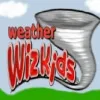Take a look inside 5 images
Weather Wiz Kids
Pros: Kids can connect with a real-life meteorologist as she shares her passion for weather.
Cons: Ad-heavy site is missing the support and educational depth present in higher-quality science tools.
Bottom Line: A cool firsthand look at the real-world work of meteorology, but look elsewhere for stronger classroom connections.
Weather Wiz is best used when teachers modify the tasks to provide more opportunity for inquiry. Try letting kids make their own observations and conclusions using a science notebook. Students could create a POE table, making a prediction, writing down observations, and then writing their own explanations for what they see. Once students have experienced the various weather phenomena, they can engage in classroom discourse around what they see.
Meteorologist Crystal Wicker created Weather Wiz Kids to help kids learn about weather. Kids can explore topics like weather forecasting, optical illusions, lightning, and even how to become a meteorologist. They can also learn about natural disasters including earthquakes, sink holes, wildfires, tsunamis, landslides, and volcanoes.
Each topic provides text descriptions using kid-friendly language and definitions to vocabulary terms. Lesson plan links, experiments, and science fair project ideas are also organized by each topic. Experiments include explanations to make a rain gauge, track a thunderstorm, and build a baking soda volcano.
Weather Wiz’s biggest strength is the personal narrative from Crystal Wicker describing what she does as a meteorologist. Kids will connect with the pictures of her at work and her “How I got this job” story. Kids will also like the silly weather jokes, though these won't actually help them learn about weather. The site does include some lesson plans from Teach-nology and Discovery Education; these range from quality investigations comparing actual USGS data with plate tectonic boundaries to basic worksheets where you match weather symbols to words. Science experiments provided by Weather Wiz are more like directed activities than investigations. In the Water Cycle experiment, kids follow specific directions for how to observe evaporation using a paper cup and a plastic bag. Unfortunately, the experiment ends there; Weather Wiz misses opportunities for kids to truly engage in science by designing and conducting their own experiments.
Weather Wiz may have some fun projects, but it doesn’t embody the best practices outlined by the Next Generation of Science Standards. Depending on your needs, it could be a neat fit for your classroom, but keep in mind that you may need to add context and extension activities to promote deep learning.













